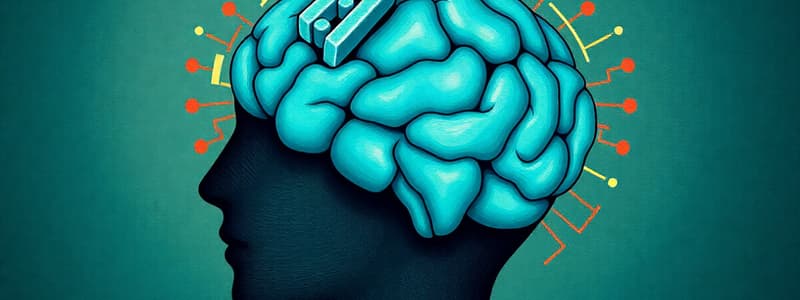Podcast
Questions and Answers
Which philosophical perspective aligns with the early development of REBT, emphasizing empirical observation and conclusion-drawing?
Which philosophical perspective aligns with the early development of REBT, emphasizing empirical observation and conclusion-drawing?
- Logical Positivism (correct)
- Phenomenology
- Existentialism
- Idealism
In what way did REBT's stance differ from that of radical postmodernism?
In what way did REBT's stance differ from that of radical postmodernism?
- By completely rejecting the concept of objective reality.
- By opposing the notion of absolute 'musts' and 'shoulds'. (correct)
- By advocating for cultural relativism in all aspects of life.
- By emphasizing the importance of individualistic interpretations of reality.
How does REBT view the influence of culture and society on an individual's personality and thought patterns?
How does REBT view the influence of culture and society on an individual's personality and thought patterns?
- They are purely individualistic and detached from social constructs.
- They are solely determined by innate characteristics.
- Personality encompasses both innate elements and those shaped by relationships and society (correct)
- Personality and thought arise almost entirely from relational and social influences.
What implication does the REBT principle that solutions to problems depend on our chosen goals have?
What implication does the REBT principle that solutions to problems depend on our chosen goals have?
How does REBT view the role of fixed, absolutistic 'musts' in an individual's emotional well-being?
How does REBT view the role of fixed, absolutistic 'musts' in an individual's emotional well-being?
What is the philosophical basis of REBT in relation to philosophy and psychology?
What is the philosophical basis of REBT in relation to philosophy and psychology?
Why is 'positive thinking' sometimes insufficient in addressing deeper emotional issues, according to REBT?
Why is 'positive thinking' sometimes insufficient in addressing deeper emotional issues, according to REBT?
What crucial element leads to true, lasting change, rather than temporary relief, in REBT?
What crucial element leads to true, lasting change, rather than temporary relief, in REBT?
Why is REBT considered unusually open to clients from various cultural and minority groups?
Why is REBT considered unusually open to clients from various cultural and minority groups?
According to REBT, when is it considered "rational" for clients to align their basic goals and purposes?
According to REBT, when is it considered "rational" for clients to align their basic goals and purposes?
What does rational mean in the context of REBT?
What does rational mean in the context of REBT?
In REBT how are irrational and self-defeating concepts related?
In REBT how are irrational and self-defeating concepts related?
What is a key component of what REBT refers to as healthy negative feelings?
What is a key component of what REBT refers to as healthy negative feelings?
According to REBT, what characterizes unhealthy negative feelings?
According to REBT, what characterizes unhealthy negative feelings?
What does REBT assert regarding the intrinsic relationship between desires and demands?
What does REBT assert regarding the intrinsic relationship between desires and demands?
What is a point of departure for REBT from other approaches to psychotherapy?
What is a point of departure for REBT from other approaches to psychotherapy?
According to REBT, what is a unique human feature for managing irrational thought?
According to REBT, what is a unique human feature for managing irrational thought?
Which of the following statements aligns with REBT's perspective on human self-sabotage?
Which of the following statements aligns with REBT's perspective on human self-sabotage?
Which of the following is an aspect of REBT?
Which of the following is an aspect of REBT?
Within the scope of REBT, which of the following assertions is most accurate?
Within the scope of REBT, which of the following assertions is most accurate?
Flashcards
Logical Positivism
Logical Positivism
A philosophical stance stating truth is found through scientific facts and conclusion. Originated REBT.
REBT & Postmodernism
REBT & Postmodernism
REBT is against absolute musts/shoulds, so truth is not absolute.
Personal Constructions
Personal Constructions
Views of good/bad are constructions. Universal truths are impossible.
Arguable Solutions
Arguable Solutions
Signup and view all the flashcards
REBT Constructionist
REBT Constructionist
Signup and view all the flashcards
REBT's Origin
REBT's Origin
Signup and view all the flashcards
Change Core Beliefs
Change Core Beliefs
Signup and view all the flashcards
Rational Beliefs.
Rational Beliefs.
Signup and view all the flashcards
REBT's Multiculturalism
REBT's Multiculturalism
Signup and view all the flashcards
Rational vs Irrational REBT
Rational vs Irrational REBT
Signup and view all the flashcards
REBT: Self-Helping.
REBT: Self-Helping.
Signup and view all the flashcards
Healthy Negative Feelings
Healthy Negative Feelings
Signup and view all the flashcards
Healthy vs Unhealthy Feelings
Healthy vs Unhealthy Feelings
Signup and view all the flashcards
Preferences vs Demands
Preferences vs Demands
Signup and view all the flashcards
Human Rationality
Human Rationality
Signup and view all the flashcards
Human Disturbance
Human Disturbance
Signup and view all the flashcards
Human Sabotage
Human Sabotage
Signup and view all the flashcards
Groups Add Irrationalities
Groups Add Irrationalities
Signup and view all the flashcards
Language Thinking Ability
Language Thinking Ability
Signup and view all the flashcards
Reduce Self-Damning
Reduce Self-Damning
Signup and view all the flashcards
Study Notes
- REBT has two kinds of theories at its foundation: its philosophical outlook/general theory of human personality/disturbance and its theories of therapeutic change.
Postmodern Philosophy and REBT
- AE originated REBT as a logical positivist, someone who believed that truth was not absolute or pure, but that scientists come close to it by finding facts and drawing conclusions; truth is temporary.
- REBT has always been fairly postmodern, notably against absolute musts and shoulds, and therefore opposed to the notion of absolute truth.
- Main postmodern ideas:
- Some kind of indubitable objective reality may exist, but we only seem to know it through our fallible, personal-social, different, and changing perceptions.
- Views of what is good/bad and moral/immoral are largely personal-social constructions; identifying universal truths is an impossible task, and all ethical beliefs have a constructive nature.
- Human personality has innate elements but also arises from relational and social influences and is less individualistic than commonly thought.
- People are influenced or conditioned by cultural rearing; behaviors are multicultural and there is no conclusive evidence that their cultures are better or worse.
- Solutions to problems depend on choosing goals and purposes; these are arguable and never absolute.
- REBT emphasizes thinking and working in a flexible and adaptive manner.
- REBT helps clients see how they create core dysfunctional philosophies and how they can constructively change them.
Philosophical Emphasis of REBT
- Much of the theory of REBT derives from philosophy rather than psychology.
- REBT favors clients making philosophical changes instead of only disputing specific Irrational Beliefs and automatic negative thoughts.
- REBT does not favor “positive thinking” or the replacing of negative thoughts with optimistic ones.
- Donald believed he was bad because he cheated his brother; positive thinking mantra did not help.
- REBT helped Donald dispute his Irrational Belief and adopt Rational Beliefs.
Multicultural Aspects of REBT
- REBT is open to clients from different cultures/minority groups because it opposes absolutistic, rigid thinking.
- REBT encourages preferences, goals, desires, and standards as long as people do not insist that they and others "must" follow them.
- REBT discourages clients from goals and values held in self-dictatorial or other-dictatorial ways.
- Therapists are free to help clients achieve their own goals/values but refrain from taking them to "musturbatory" extremes.
How Does REBT Define Rational and Irrational?
- In REBT, rational does not mean unemotional.
- Rational means "that which helps people to achieve their basic goals and purposes," whereas irrational means "that which prevents them from achieving these goals and purposes".
- Rational means self-helping, and irrational means self-defeating.
- Rational also means helping the group to survive and achieve its basic goals.
Healthy and Unhealthy Negative Feelings in REBT
- REBT states that feelings are "natural" and automatically follow thoughts or stimuli clients view as obnoxious or unpleasant.
- This is a healthy reaction; without negative feelings, people would not try to reduce negative stimuli.
- Positive feelings also motivate people to survive and be productive.
- REBT distinguishes between healthy negative feelings (sorrow, regret, frustration, annoyance) and unhealthy negative feelings (panic, depression, rage, self-pity).
- Healthy feelings produce self-helping and community-helping actions; unhealthy feelings interfere with reparative acts or result in inaction/destructive behavior.
- REBT encourages clients to feel strongly about succeeding but not to raise their strong desires to absolutistic demands.
- The REBT theories of desires and preferences vs. musts and demands say that these personal tendencies are intrinsically related and virtually all humans have both.
Biology and Human Rationality and Irrationality
- REBT suggests people innately and via social teaching develop into rational and irrational thinkers, unlike other psychotherapies that teach that human disturbance is primarily learned or conditioned.
- People are born constructivists, creatively solving problems for survival.
- Humans are more creative about what to think, feel, and do to survive.
- Humans have a wider range of pleasurable activities, and are more practical and self-actualizing than other animals.
- It's easy to emphasize human constructivism and downplay destructivism.
- Virtually all people sabotage themselves/others, despite efforts/desires to do better.
- Cultural groups add disturbance-creating irrationalities (absolute musts/demands) about their rules/standards.
- Human self-defeating behaviors exist, such as lack of discipline and procrastination.
- People who vigorously oppose "foolish" behaviors often engage in them.
- Millions acknowledge their self-harming behaviors, such as excessive drinking/drugging, yet consistently indulge in them.
- Individuals fall back to destructive acts, such as aggression/gambling, that they have worked hard to overcome.
- People often find it easier to perform self-destructive acts, such as overeating.
- Psychotherapists, who presumably know best what is destructive behavior, frequently engage in it.
- Virtually all people are born as well as raised to be irrational but are also largely rational.
- People can think about their irrational thinking, and to think about thinking about their thinking, so they are still constructivist.
- Relieving clients from self-damning requires letting them know they often think, feel, and act defeatingly, but can change themselves, and require work to reduce self-sabotaging.
Studying That Suits You
Use AI to generate personalized quizzes and flashcards to suit your learning preferences.




